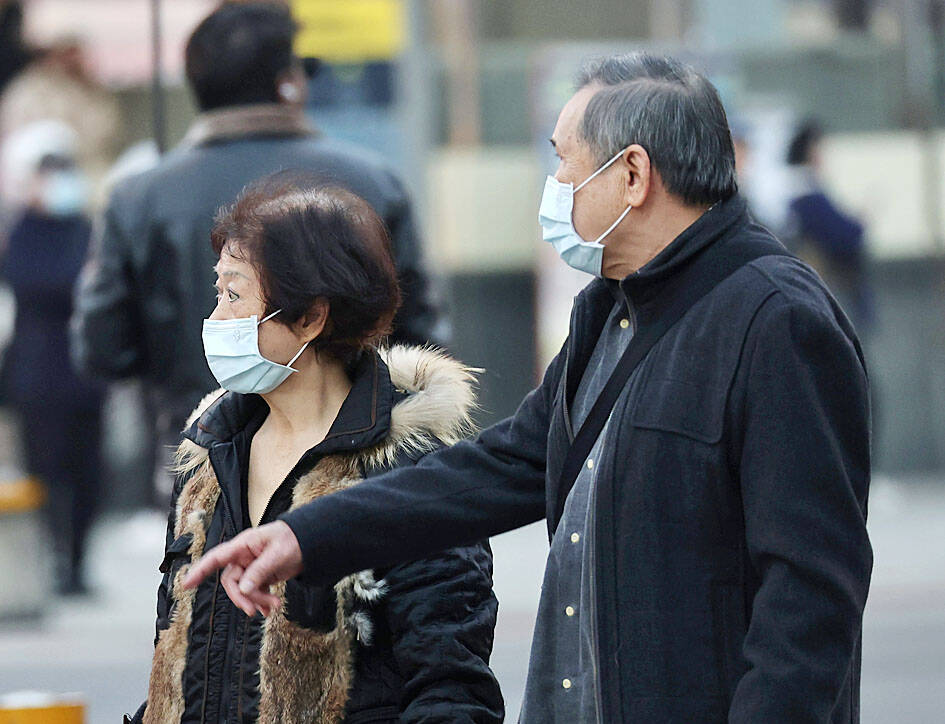PREVENTIVE MEASURES:
People at a higher risk of serious complications from the disease, including the elderly and young children, are advised to get vaccinated
-
By Lee I-chia / Staff reporter
The Centers for Disease Control (CDC) yesterday reported that hospital visits for flu-like illnesses last week rose to 139,613 — the highest in a decade for the same period — while there were 49 serious flu cases and 10 flu deaths.
Signs show that flu activity is still increasing, CDC Epidemic Intelligence Center Director Guo Hung-wei (郭宏偉) said, urging people to get vaccinated and to take personal preventive measures.
Lab monitoring data show that the influenza A virus accounted for 92 percent of identified flu cases in the past four weeks, with H1N1 being the dominant strain, he said.

Photo: CNA
Of the 49 confirmed cases of serious flu complications last week, 92 percent did not get vaccinated this season, Guo said, adding that of the 10 confirmed deaths last week, eight were not vaccinated.
From the start of this flu season on Oct. 1 last year, 461 cases of serious flu complications have been reported, including 101 deaths, he said, adding that more than 90 percent were unvaccinated.
Flu activity in several neighboring countries has also been increasing, including significant growth in Japan and South Korea, with influenza A (H1N1) also the dominant strain in most of these countries, Guo said.
CDC physician Lin Yung-ching (林詠青) said the youngest flu death last week was an unvaccinated teenage boy in southern Taiwan, who did not have underlying health conditions.
He began showing symptoms, including a fever, cough, dizziness and general weakness late last month, Lin said.
The boy tested positive for influenza A during an emergency room visit and returned home after his symptoms were relieved, Lin said.
However, he was rushed to the hospital again the next day due to high fever, vomiting, altered consciousness and difficulty breathing, and he died of cardiovascular failure that day, Lin said.
CDC Deputy Director-General and spokeswoman Tseng Shu-hui (曾淑慧) said the centers estimate that hospital visits for flu-like illnesses would continue to increase, reaching a peak of about 150,000 in the week around the Lunar New Year holiday.
People who are at a higher risk of serious complications from the disease are encouraged to get vaccinated as soon as possible, she said, adding that eligibility for publicly funded vaccines has been expanded to all people aged at least six months since Jan. 1.
As respiratory viruses often peak in the winter and many people are expected to attend year-end parties or gatherings around the holidays, the CDC advised the public, especially elderly people, young children and people with chronic illnesses, to get vaccinated against flu and COVID-19, and to take personal preventive measures.
In other developments, Tseng said that preliminary test results of people who reported feeling ill after eating at the buffet restaurant INPARADISE (饗饗) Breeze Xinyi branch in Taipei earlier this month found that nine were infected with norovirus.
Seventy-seven people reported feeling ill after eating at the restaurant between Jan. 5 and Wednesday last week, including vomiting (78 percent), diarrhea (77 percent), nausea (68 percent), fever (28 percent) and abdominal bloating (14 percent), she said.
Those who sought medical treatment were all diagnosed with gastroenteritis, and none were hospitalized, Tseng said, adding that samples from 73 people showed nine were infected by norovirus.
The Taipei Department of Health is still inspecting the restaurant’s environment and food samples, she said.
Guo added that hospital visits for diarrhea last week surged to a five-year high for the same period of 169,747, up 13.6 percent from the previous week.
#Flu #hospital #visits #rise #highest #decade #CDC











Leave a Reply